#institute in basic life principles
Text
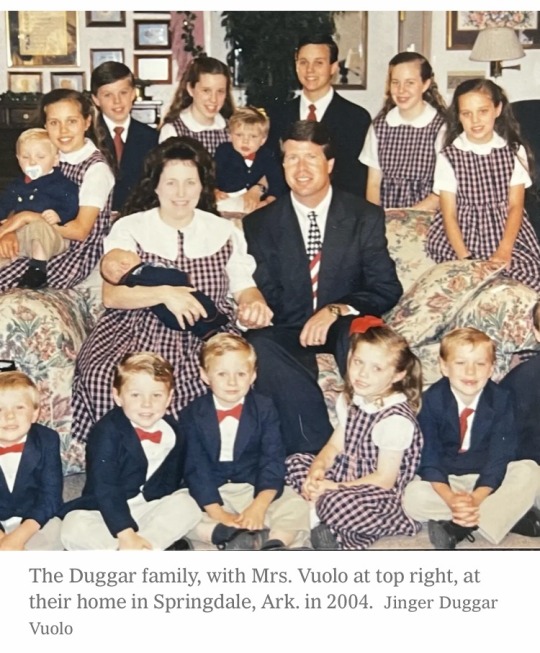

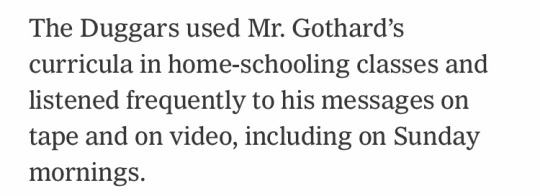
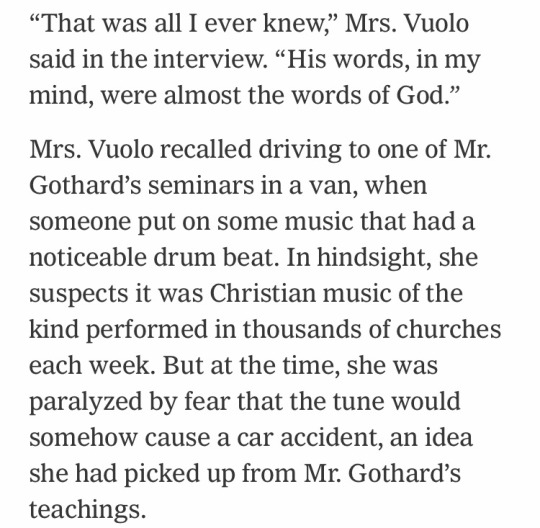
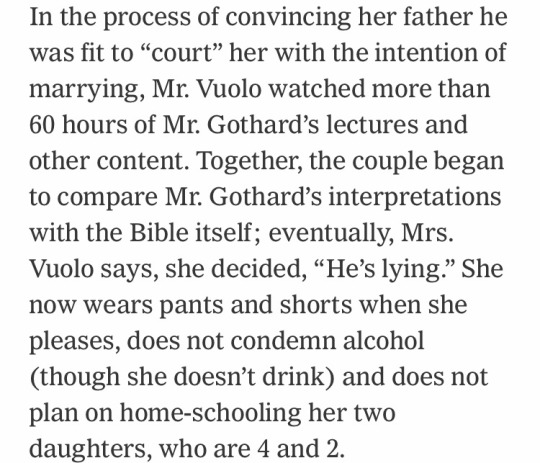


A few small snippets from the NYT piece about Jinger. Still weirds me out that she’s upset by Josh’s “hypocrisy” over, you know, all that other stuff but hey.
#Jinger Duggar Vuolo#duggar family#vuolo family#2023#institute in basic life principles#bill gothard#vintage duggars#2004
17 notes
·
View notes
Text
Wisdom Booklets Still Burn at Fahrenheit 451 (part 1)
***TRIGGER WARNING: talks of Christian Fundamentalism, rape, child porn, and sexual assault***
I have realized that when I get close to the truth, other people online start calling me “annoying” or “weird”.
I realized that a lot of them happen to be Christian Fundamentalists.
Like the Duggars.
There is a part of the book The Handmaid’s Tale (I can hear American minorities groaning in the…

View On WordPress
0 notes
Text
ok my mom understandably had to go to bed (very late here in her time zone, and it's even an hour later in the one I'm used to) but I'm a mental masochist so I will trudge on until I can't physically watch Shiny Happy People anymore (and I'm just going to edit my comments instead of reblog bc so far there's really not a lot most of us aren't aware of):
- firstly, I knew Deanna was raised Christian but I didn't know she was raised VERY conservative Christian. Per Deanna, this is the reason Amy was allowed so much freedom; she didn't want to limit her as a female in any of the ways she was
- going off of that, I can see how that foundation would open Jim Bob up to a religion that is so insanely misogynistic
- I know it's a thing all of us who've been around a while have known, but it's all but explicitly said that the Duggar kids had any steal of rebellious beat out of them. By Michelle, regardless of what she sounds like.
- I can't help but wonder if this is the reason Michelle sticks so closely to this faith, even after all that's happened. Even as her own children have expressed how abusive their upbringing was. Leaving the ideology means admitting you were an abuser and not an educator.
- Jill felt like she lied in the Megyn Kelly interview. She didn't want to do it and said she wouldn't have without her parents urging, and she felt obligated to protect her family. She didn't want to do this interview, but didn't trust anyone else to tell the truth which, given her upbringing, I totally get.
- the interviews with other ex-IBLP kids are just as fascinating to listen to as Jill's (if not more bc a lot of them WANT to be there). Tia Levings in particular is so incredibly brave and wonderful, please follow her your preferred platform ❤️
- Mike Huckabee is an accomplice to abuse and ped*philia at best
- I know Derick can be insufferable but I promise he's worth listening to in this doc, at least so far (I'm halfway through episode 3). And he's a very serious Jill advocate, which I feel like all the Duggar girls need so badly.
- Jill didn't want anyone at her birth because SHE DIDN'T WANT TOO GO THROUGH WHAT ANNA WENT THROUGH. She agreed to a diary cam at most.
- For that work they did during their babies birth, the Dillards requested not a full paycheck, but a small health insurance renumeration fee from TLC, who asked them to do this work. TLC informed then that they had already paid all sums to Jim Bob.
- Jill has never received any amount of payment from TLC for all the time and work she had given them. Neither had Derick.
- this is probably a NO DUH for us around here, but here is a short list of IBLP/ATI approved lives of training, especially for minors who are doing work for free for other members of the organization (i believe the Bates kids are included in some of the pictures accompanyingthis part):
1. CoNSTrUCTioN!!!
2. Cosmetology (women only of course)
3. Ministry
4. Business?
5. Healthcare consultant
6. ALERT counselor
Secular college courses so not apply to accreditation in these fields
- other ex-IBLP members confirm that children were trained in construction trades and child labor was used gratuitously in the organization, for anything from repairs, to setting up conferences, to building actual buildings. And it was all, of course, free.
- ALERT confirmed as a purposeful paramilitary organization
- am ex-IBLP woman who was sent to ALERT states that they took tampons away from her, as they were a form of purity violation (she says they said she had purposefully taken her own virginity by using them).
- a woman raised in IBLP recounts a story at a conference in Oklahoma City where her roommate almost slit her throat with a knife over being a 'glutton'. Essentially, a teenage girl almost killed herself over not being thin enough to be 'godly'.
- David Green, the CEO of Hobby Lobby, is STILL IBLP's biggest donor. Don't fucking shop there!!!!
- a purposefully sanitized version of Bill Gothard's teachings have been and might still be used in elementary schools, prisons, police and military units as a way of indoctrinating those in attendance to be more open to absolute authority.
- All of the kids besides Jill & Derick might've very well signed a very lengthy contract that extends at least a decade. The Dillards didn't, and have received extreme yet Christian-flavored threats over it???
- The Dillards were using a food bank even after they asked Jim Bob for the most basic payment for their services to the show
- Jill, Derick, and others all agree tha Journey To The Heart was a vetting mechanism for Gothard's abuse victims
81 notes
·
View notes
Text
Jinger Duggar's Book Illustrates the Toxicity of Complementarian Theology
A few years ago, I was interviewed by a journalist writing about Gothard’s Institute for Biblical Life Principles (IBLP) and how his views on gender might have contributed to the numerous accusations emerging about his sexual abuse of women who had worked with him.
I don’t think the journalist ever got the article published, which is, unfortunately, what sometimes happens in freelance…
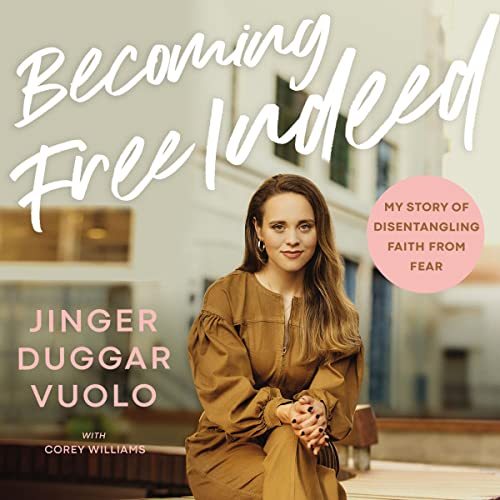
View On WordPress
#Becoming Free Indeed Book Review#Bill Gothard#Duggar Family#Institute for Basic Life Principles#Jinger Duggar
0 notes
Note
that post about toph is so real.. i think she would be an amazing earthbending teacher.. i can just picture her being tough love esque but also genuinely loving the job as a way to embrace her skills and culture and help others embrace their skills especially when her own parents tried to stifle hers
i mean, she already is a teacher! that’s her primary role in the show! and it’s true, that’s exactly how she is with aang. i do think she’d continue teaching (although not in the very formal way the comics present it, she would literally never start an actual school, being opposed to all institutions on principle). she’d really only select students she felt she could vibe with and who showed real potential, but also displayed curiosity, creativity, and humility, much like piandao. being trained by toph beifong would be an incredible exalted honor (also much like piandao, only in earthbending as opposed to swordsmanship) and she would foster very close relationships with all her students over the years. she could never train more than one student at a time though, because earthbending is such a personal and intimate process to her. she needs to take you into the mountains to meet badgermoles, really focus all her energy into helping you fulfill your own self-actualization through honing your craft. much like the way she helps korra in the swamp (for the record i am always saying that toph would make a great, albeit highly unconventional, therapist).
and speaking of korra, i like to think that lin and su were not her biological children (as if, she’d make katara those thangs so fast), but rather two of toph’s more promising protégés who both eventually broke her heart by choosing life paths she disagreed with. and they were both orphaned at a very young age, hence why she ended up raising them, but also sometimes resented the burden of basically having daughters when she never ever wanted to be a mother. and i think her refusal to outright call them her daughters or define them as her family would also become a wound that festers for them, even if she feels completely justified in that decision. but yeah. it’s obviously completely unrealistic that she would be a cop and a mother by choice, but i do think that this reworking does make sense for her, because as much as i disagree with many of the choices made in lok, i do think lin and su are fascinating characters in their own right, and with some tweaking, could actually make sense as they are incorporated and positioned in the narrative.
#swampfields#asks#went into a tangent there but. since we’re already on the topic of toph’s future#she would not be a mother!!!!!!!!#but she would have protégés who live in her house lmfao#toph#lin#su#aang&toph#korra&toph#lin&toph#su&toph#lok crit#postwargaang
74 notes
·
View notes
Text
the episode on Cold War Liberalism of Know Your Enemy is dense in a delightful way, and Samuel Moyn has a lot to say about the evolution of liberalism as an idea that I think is really interesting. His basic contention is that, essentially, the Cold War ruined liberalism, and the thing we think of when we think of liberalism nowadays is, in many ways, a shadow of its former self. Bullet points of bits I found interesting:
Earlier liberals engaged productively with thinkers like Marx; there was a strand of ambition and an idea of a gradual process of perfection that led to some of liberalism's greatest accomplishments, like the welfare state. Even out-and-out leftist figures like Marx could admire aspects of liberalism that were emancipatory (albeit within strict limits that had to be overcome).
During the Cold War, liberals became enamored of a theory of totalitarianism that didn't differentiate much between the right and the left, and shrank from its earlier ambitions, becoming--through vehicles like neoliberalism--less and less distinguishable from various flavors of conservatism. This eventually led liberals to turn away from liberalism's formerly successful achievements, including against the robust welfare states that had done so much in the middle of the century.
It's not like pre-Cold War liberalism wasn't bound up with ideas about laissez-faire economics (and even imperialism), long before neoliberalism arrived on the scene. Nevertheless, some of the earliest liberals still had promising ambitions: Moyn cites "perfectionism" ("perfection" here being understood more in the sense of "a process of improvement" rather than "a final unchanging state"), which he contrasts against (in more recent theory and practice) "tolerationism." Tolerationism sees liberalism as sort of merely the thing that lets people get along and which prevents bloodshed; figures like Alexis de Tocqueville and John Stuart Mill weren't merely tolerationists in this sense; they weren't aiming for a world in which people merely muddled along, but had the ambition to achieve the highest life for humanity, and thought that you could create institutions that promoted this, via (or perhaps while also) promoting public and private freedom. In other words, perfectionism is a kind of positive (almost utopian) vision for liberalism to aspire to, but one which contemporary liberalism lacks. In this way liberalism was also both explicitly emancipatory and progressive, in a wauy which, again, Moyn contends present-day liberalism is not, having set its sights considerably lower.
Our instinctive sense of what liberalism consists of nowadays--something beleagered, timid, and not especially aspirational--is a product of the Cold War. The traumas of the world wars and the tensions of the Cold War seemed to produce what you might call a trauma response against ambitious and utopian ideas within liberal thought, albeit one that (like a lot of trauma responses) was reactive and self-limiting rather than a fully rational course-correction--call this allergy to real ideological commitment the "liberalism of fear," after Judith Shklar's work of that name. Although even Shklar was distasteful of neoliberals, who, she argued, abandoned the principles of the Enlightenment simply because the Soviets tried to claim them as well.
Cold War liberals seemed to take the Soviet Union at its word that they were the sole inheritors of the Enlightenment, the ideas of the French Revolution, and even of reason, science, and history; they contended themselves with something much more minimalist and timid, without the emancipatory element that was crucial to Enlightenment thought and abandoning useful lessons learned from writers like Marx.
European Catholics declare the Cold War long before liberals join in. Liberalism had helped to create socialism after all; there were once real points of ideological consonance between the two and many liberals were interested in the early days in seeing how the Soviet experiment would turn out. These writers coin the idea of totalitarianism as a thing uniting both the communists and Nazis. But they are perfectly fine with places like interwar Austria. They don't like the Nazis because of the pagan overtones, but these are not liberals!
Popper's contribution to this project is to decanonize and demonize historicism. He associates Hegel and Marx with his "very cramped understanding of what historicism is," i.e., a commitment to lawlike inevitable processes in history. But while attempting to cast that rather narrow idea into disrepute, he tars a much broader swathe of ideas with his brush--including (if I understand this part correctly) the thoughtful and deliberate engagement with the place of one's ideology and political aims in a larger historical context. Liberals sort of give up any claim on history because of Popper, which Moyn thinks has been particularly disastrous especially since the end of the Cold War. Liberals do not give people much to believe in anymore, either because history is over or because justice is sitting there at the end of the moral rainbow and we'll get there eventually if we just wait and vote Democrat without engaging in major criticism of structures of power.
There's an interesting point in this part about how nowadays nobody believes in positive teleologies anymore--"progress" on a grand scale--but only negative ones ("the slingshot to the atom bomb," to paraphrase Adorno).
The irony of course is that at the beginning of the Cold War, while liberals were as a group abandoning the whole idea of emancipatory politics, they were (for a short time) engaged in building some of the most triumphantly emancipatory institutions in the history of liberalism, in the form of strong welfare states. Rawls comes along and creates a robust theory of the welfare state in 1971, but only once the dismantling of these institutions has begun.
Only halfway through the episode so far, but it's a lot to chew on. It certainly resonates with my own frustrations with liberal politics, where liberals keep wringing their hands about the rise of far-right populism, and then going "I know what the answer is! It's a minor tweak to the tax code!" Like parties across the center-right/center-left spectrum are terrified of actually articulating any kind of coherent political vision, so of course the people who do that (even if their vision is a Hieronymous Bosch-style grotesque of the world) are going to have the advantage.
100 notes
·
View notes
Text
"oh you're obviously just uneducated on the social model because you've only heard it explained for abled people, 'in a perfect world no one would be disabled' is only so they can understand!!!!"
i've been disabled since birth. i've been exposed to disability activism my whole life. disabled people in disabled spaces, especially in leftist spaces, solely explain it to other disabled people that way. specifically in leftist spaces the social model is used by vast swaths of low support needs disabled people to allege that disability only exists because of capitalism, and it wouldn't under whatever financial model they're pushing. academic papers targeted at people who are educated in these terms explain it that way.
the social model can only work in a perfect world that, frankly, will never exist and only for people who are not significantly impaired. the whole thing reeks of "the only disability is a bad attitude" and "maybe if you tried harder, you wouldn't be disabled".
no level of accommodation will change the level of impairment i face, do you know how i know this? because i have lived in this body for a quarter of a century, i know my experiences and i'm tired of people telling me i'm wrong.
disability activists who face impairment beyond what can be accommodated have been pushing back against the social model for decades. the social model centres disabled people with low support needs and low impairment. how dare you invalidate my experience as well as the experiences of countless other disabled people who feel abandoned and ignored by the social model?
a great example of how the social model fails is stephen hawking who, despite being very vocal about being able to afford total accommodation for his disability brought on by his als, was also still deeply impaired by his disability.
the social model also stigmatizes and removes agency from individual disabled people having the ability to make their own choices about their treatment and accommodations, newsflash not everyone wants all of that and they should be able to choose.
there are many far more sufficient models that we can use, i don't think we will find equity and liberation from just one. the models i find the most useful are:
empowering model allows for the person with a disability to decide the course of their treatment and what services they wish to benefit from
diversity model focus[es] attention on how society's systems respond to variation introduced by disability... question[s] the socio-political definition of disability, in which (all) barriers faced by people with disability are imposed and therefore removable... insufficiently recognizes that impairment does have a bearing on accessibility outcomes
affirming model a non-tragic view of disability and impairment which encompasses positive social identities, both individual and collective, for disabled people grounded in the benefits of lifestyle and life experience of being impaired and disabled
human rights model based on basic human rights principles... recognizes that: "disability is a natural part of human diversity that must be respected and supported in all its forms" and "people with disability have the same rights as everyone else in society" and "impairment must not be used as an excuse to deny or restrict people’s rights"
additionally, i find it very telling that supporters of the social model speak over and silence disabled people who point out it's failings. if you refuse to listen to us there is no way i can believe your model will actually be beneficial to me and other disabled people with similar feelings.
here is a paper from kay shrinier and richard scotch on their critisms of this model
Disability and Institutional Change: A Human Variation Perspective on Overcoming Oppression
#actually disabled#disability#disability rights#disability activism#anti social model of disability#anti social model#really hate when people talk down to me
239 notes
·
View notes
Text
Ok sooo, I can’t stop thinking about the line from this post [here] by @swordfright , “Sam is a builder and dream is the ultimate engineering project: challenging (psychologically taxing to guard), important (to the stability of the server), rewarding (on those sporadic occasions when dream obeys him without question), and ceaseless (because the ideal prisoner always needs a warden to keep them in line.)” Because the idea that Dream is Sam’s “ultimate engineering project” really got me thinking about the definition of the duties of an engineer as per the Code of Ethics, which I studied in college.
As an engineer it is basically our responsibility to maintain sustainable development, which The National Society of Professional Engineers (NSPE) defines [here] in the Code of Ethics as, “meeting human needs for natural resources, industrial products, energy, food, transportation, shelter, and effective waste management while conserving and protecting environmental quality and the natural resource base essential for future development.” Even further, as a civil engineer (which I am and Sam is as a primary builder) it is our job to help provide the infrastructure and necessities to life, (shelter, water and by extension food +) with civil engineering encompassing the engineering fields of Structural (bridges, buildings, dams… etc), Utilities (power, gas, water, waste water… etc), Geotechnical (analyze and maintain that the ground can support projects), Environmental (protecting the stability of the environment like for example protecting the habitat of an endangered species), Transportation (roads for cars, train tracks, airplane runways… etc). Pretty much the necessities of civilization (lol hence civil). And I found this interesting because it is Sam’s job as the warden to provide the fundamental and basic necessities of Dream’s life in every way. So, in this way Dream would actually be the society Sam’s engineering is meant to benefit from and depends on (which he obviously denies and uses to abuse.)
But on the other side, interestingly a 2004 definition, [found here] of civil engineering based on Thomas Tredgold’s 1828 original is, “the art of working with the great sources of power in nature for the use and benefit of society”. And oh, the use of power here could very well be a good representation of Dream, making him actually the engineering project. Further, The NSPE Code of Ethics states, “Engineering has a direct and vital impact on the quality of life for all people. Accordingly, the services provided by engineers require honesty, impartiality, fairness, and equity, and must be dedicated to the protection of the public health, safety, and welfare.” In this sense, Sam’s position as the warden was dedicated to the protection of the public health, safety, and welfare, which by keeping Dream locked up, weakening him physically and mentally he was in essence trying to protect the server as well as working to strip the sources of power Dream had over everyone. And when his methods didn’t work, he let Quackity in, which funnily enough goes along with one of the The Institute of Industrial and Systems Engineers (IISS)’s summarizing stated [here] fundamental canons, “Engineers shall perform services only in the areas of their competence.” And clearly Sam was not competent in getting the book from Dream, so he teams up with Quackity, his contractor, to finish the project as is typical in the engineering industry.
All this to say, that Sam as an engineer, while not sworn to follow a defined of code ethics still followed the general defined duties of engineering and strived to work for the betterment of the server. A personality and behavior, that Dream saw in him as they grew as friends and worked to build the prison - Sam’s passion for helping, to provide for and develop the necessities of society. His passion for wanting to use his skills to improve the world and help people. His strong principles of dependability, efficiency, justice, work ethic. If Sam was given a job to help people he was going to see it through to the best of his ability. He would not abandon his post, he would protect and serve the common good. - His strong engineering attitude made him a good choice in Dream’s mind for the warden, because of these qualities, which makes sense. What Dream did not realize is that he was not included in the society and all people Sam felt obligated to serve and provide for.
Instead, Dream was but a resource of power - the revival book - needing to be made efficient and accessible, so that everyone could benefit and share that power. Dream thought he’d be provided for and taken care of, but he was the project instead. Sam’s “ultimate engineering project” he deemed too damaged like a bumpy road or crumbling building that wasn’t worthy of patching and filling in the cracks or reinforcing, that’s too eroded to be fixed and preserved. So, Sam strived to tear him down to the bedrock so he could remake, remold, and reengineer Dream according to his design for the common safety, public health and well-fair. He was such a good engineer just like Dream knew he would be, he just forgot the whole teeny weeny ethics part of being an engineer that kind of comes with the job description… Oh well. ;)
#poor dream depending on his engineer to keep him safe and being let down in the biggest of ways#he ran from a war to a building and trusted it to keep him safe but it collapsed instead destroying him…..#did I make sense…. I’m not sure I got my thoughts across..#hmm oh well words are hard sometimes…#c!dream#dsmp#dreblr#dream smp#pandora's vault#dsmp analysis#c!sam#c!sam and c!dream#this is fine#did someone order an essay?#welll… blame swordfright for giving me brain rot… lol XD#pandora’s vault has a singular purpose#probably gave you way more engineering info than you wanted but… of well lol <3 :)#oh sam… never ceases to break my heart…#sam the most unethical engineer and he didn’t even steal more from the government#or bribe or cut corners he just straight up neglected the fact that all people includes all people…
24 notes
·
View notes
Text
I'm writing a plan for a solarpunk social revolution
I think at this point we all have an understanding that things in the world aren't good. That's useful information, but that's also only step one.
Next, is broadly to figure out, "what the heck do we do?"
I've been doing a lot of listening and reading about that, and I'm trying to formulate my thoughts, to create a guide of sorts. I'm gonna sketch out my framing for it, with the areas of focus and basic tenants. This is going to be an iterative process, so let me know what you think about this! If u have the stuff to add or change, I'm cool with that!
Basic Needs (Pillars for Life)
These are the things that people deserve to be provided in order to live a comfortable life. The brave new world should be able to provide these things.
Shelter: A safe and secure place to live is essential for a comfortable life. This could be a house, apartment, or another type of dwelling.
Food and water: Adequate nutrition and hydration are essential for maintaining good health and well-being.
Clothing and personal items: Clothing and personal items such as toiletries help people feel clean and presentable, and can also provide protection from the elements.
Health care: Access to quality health care is important for maintaining physical and mental well-being
Transportation: Having access to reliable transportation can make it easier to get to work, run errands, and participate in activities.
Communication: Being able to communicate with others, whether through phone, email, or other means, can help people stay connected and feel less isolated.
Education: Access to education can help people gain knowledge, skills, and opportunities for personal and professional growth.
Technology, electricity, and internet access: Access to technology and the internet can facilitate communication, education, and access to information and resources.
Art, Media, Entertainment, and Play: People often need activities or hobbies that provide enjoyment and help them relax and de-stress.
Social connections: Strong social connections and a sense of community can provide support, companionship, and a sense of belonging.
Financial stability: Having access to sufficient financial resources can help people meet their basic needs and feel more secure.
Personal safety and Defense: Feeling safe and secure in one's environment is essential for a comfortable life.
Levels/Spheres of Liberation
These are the levels at which liberation needs to occur. There's an interplay between each level: for example, you have to a reach certain standard of self-love before you can make meaningful connections with others. The more connected with yourself you are, the more connected with others you can be.
Internalized Liberation: Internalized Liberation is a state of radical self-love.
Interpersonal Liberation: Interpersonal Liberation is a state in which love is fully and freely given to all others.
Institutional Liberation: Institutional Liberation is a state of radical inclusion, where all organizations see equity as their responsibility and use an equitable process framework in perpetuity.
Systemic Liberation: Systemic Liberation is a state in which we have reconfigured societal relationships to resources to allow for ingenuity and social protections to coexist, creating the interconnected circumstances under which all people have the resources, access, and opportunity to thrive.
Environmental Liberation: Environmental Liberation is a state of harmony with the environment. Reconnecting with nature and understanding our place in it.
Ideological Liberation: Ideological Liberation is a state in which we have fully transcended and have no need for social constructs such as race; a reality where we are unbound by identity defined in contrast to others; individuals are unconflicted and feel a full and authentic sense of belonging in all spaces.
Guiding Principles
These guiding principles are the values which underpin the revolution; these are the unarguable, foundational ideas that make up the basic requirements for the movement.
Grassroots/Direct democracy: people should manage their own affairs. If something only affects you, then you do what you want. Things that affect others should involve them in the process. The goal is to find the balance between individual and collective autonomy, where the combination of each is greater than the sum of its parts.
Social Ecology: Our foundational understanding of nature is based on hegemonic values that separate us from it. This thinking coincided with the domination of people by other people around the beginning of civilization. By trying to reconnect with nature and see ourselves as part of it, while also upholding the values of liberty, solidarity, and equality, we can work towards mending our environmental and social relations.
Decentralization: civilization is an extremely complex system, and the most successful complex systems balance order and chaos thru decentralized forms. Highly centralized systems like the prevailing ones simplify things and standardize things to make them easier to manage. Having unique communities that federate based on need and shared projects leads to more resilient, creative, and emergent societies.
Anti-hierarchy, domination, and coercion: revolutions have to be led by the people, for the people. Forcing a mode of operation onto others is a non-starter. Freedom with subjugation is no freedom at all.
Liberty: people should be free to live how they want, so long as those desires don’t harm others. Matters should be decided with a maximal preference for that balance.
Free Association: all relations should be voluntary. No one should have the power to force a relationship, whether it’s for work, play, or community.
Solidarity Economies: programs, organizations, and projects that prioritize the well-being of the community over other concerns.
Diversity as Power: intersectional understanding of different identities people hold and how that informs their experiences being alive. Along with this, a recognition that the diversity of experiences heightens the chance for emergent solutions to problems.
Levels of Organization
Organizing at different scales.
Affinity Groups: a small group that’s tightly knit and focused on very specific alignment. Similar thoughts on issues, and similar interests in projects and actions.
Communes/Neighborhood Pods: connecting with people in your geographical vicinity, uniting on shared issues to be solved, moreso than shared ideology.
Organizations (platform orgs, ideological orgs, social orgs): Groups trying to change the world for the better. There would be platform orgs that contribute to ideological orgs and social orgs to provide cohesion between different projects and strengthen community resilience through federation within the community and its disparate projects.
Prisons: writing letters to prisoners and creating specific programs to abolish the modern-day slave complex that is the prison system.
Schools and Educational Bodies: creating revolutionary unions for students, staff, and faculty, and making efforts to gain direct democratic control of education.
Workplaces (Unions and Cooperatives): starting revolutionary syndicates for traditional workplaces, and starting directly democratic, horizontally run businesses.
Cities/Counties: tying all of the above things together through assemblies to have citizens directly decide on things that affect the whole city/county geographical area.
Regions: tying multiple cities/counties together, making decisions on projects that affect the region (big infrastructure and the like). This will still be directly democratic. The people who are affected by the decision will be the ones to come to the decision.
"Nations": tying multiple regions together to make very large decisions that affect the whole landmass.
Those're pretty much the areas that I'm thinking about. Am I missing anything?
#solarpunk#social ecology#social revolution#revolution#change the system#change the world#change things#climate solutions#climate action#direct action#climate change#ecology
187 notes
·
View notes
Text
Did any of you watch Shiny Happy People this weekend? It uses the Duggar family as a jumping off point to talk about the abusive practices and mindset of the IBLP (Institute in Basic Life Principles, a nondenominational Christian ministry that promotes an authoritarian family and community structure). Definitely recommend it, especially if you’re not up on your dominion theology, but, although I feel it’s handled respectfully, huge content warning for abuse and exploitation of women and children.
95 notes
·
View notes
Text
A basic tenet of a healthy democracy is open dialogue and transparency. When we talk about this concept of openness and transparency as the high-level ideal that we're moving toward on social media like Facebook. The way that we get there is by empowering people to share and connect. The combination of those two things leads the world to become more open.
The main reasons for the growth and institutionalization of corruption are a culture of secrecy with a lack of transparency, and weak institutions for securing the accountability of public servants, such as the Vigilance bodies, the criminal investigative agencies and the judiciary.
The best way for me to help with my life principles of transparency, democratization, excellence and modernity. I think it has to be like that in every area. Transparency is more sexy than a full, pancake finish.


#bwphotography#blackandwhitephotography#fashionphotography#fashiophoto#fashion#moda#fashiondesign#fetishfashion#martamiljanic#silkbodysuit#silkbody#bodysuit#instastyle#instafashion#darkfashion#darkbeauty#transparentbodysuit#transparentbody#transparency#instituinstitutionalization#moralization
51 notes
·
View notes
Text

A.2.5 Why are anarchists in favour of equality?
As mentioned in above, anarchists are dedicated to social equality because it is the only context in which individual liberty can flourish. However, there has been much nonsense written about “equality,” and much of what is commonly believed about it is very strange indeed. Before discussing what anarchist do mean by equality, we have to indicate what we do not mean by it.
Anarchists do not believe in “equality of endowment,” which is not only non-existent but would be very undesirable if it could be brought about. Everyone is unique. Biologically determined human differences not only exist but are “a cause for joy, not fear or regret.” Why? Because “life among clones would not be worth living, and a sane person will only rejoice that others have abilities that they do not share.” [Noam Chomsky, Marxism, Anarchism, and Alternative Futures, p. 782]
That some people seriously suggest that anarchists means by “equality” that everyone should be identical is a sad reflection on the state of present-day intellectual culture and the corruption of words — a corruption used to divert attention from an unjust and authoritarian system and side-track people into discussions of biology. “The uniqueness of the self in no way contradicts the principle of equality,” noted Erich Fromm, “The thesis that men are born equal implies that they all share the same fundamental human qualities, that they share the same basic fate of human beings, that they all have the same inalienable claim on freedom and happiness. It furthermore means that their relationship is one of solidarity, not one of domination-submission. What the concept of equality does not mean is that all men are alike.” [The Fear of Freedom, p. 228] Thus it would be fairer to say that anarchists seek equality because we recognise that everyone is different and, consequently, seek the full affirmation and development of that uniqueness.
Nor are anarchists in favour of so-called “equality of outcome.” We have no desire to live in a society were everyone gets the same goods, lives in the same kind of house, wears the same uniform, etc. Part of the reason for the anarchist revolt against capitalism and statism is that they standardise so much of life (see George Reitzer’s The McDonaldisation of Society on why capitalism is driven towards standardisation and conformity). In the words of Alexander Berkman:
“The spirit of authority, law, written and unwritten, tradition and custom force us into a common grove and make a man [or woman] a will-less automation without independence or individuality… All of us are its victims, and only the exceptionally strong succeed in breaking its chains, and that only partly.” [What is Anarchism?, p. 165]
Anarchists, therefore, have little to desire to make this “common grove” even deeper. Rather, we desire to destroy it and every social relationship and institution that creates it in the first place.
“Equality of outcome” can only be introduced and maintained by force, which would not be equality anyway, as some would have more power than others! “Equality of outcome” is particularly hated by anarchists, as we recognise that every individual has different needs, abilities, desires and interests. To make all consume the same would be tyranny. Obviously, if one person needs medical treatment and another does not, they do not receive an “equal” amount of medical care. The same is true of other human needs. As Alexander Berkman put it:
“equality does not mean an equal amount but equal opportunity… Do not make the mistake of identifying equality in liberty with the forced equality of the convict camp. True anarchist equality implies freedom, not quantity. It does not mean that every one must eat, drink, or wear the same things, do the same work, or live in the same manner. Far from it: the very reverse in fact.”
“Individual needs and tastes differ, as appetites differ. It is equal opportunity to satisfy them that constitutes true equality.
“Far from levelling, such equality opens the door for the greatest possible variety of activity and development. For human character is diverse … Free opportunity of expressing and acting out your individuality means development of natural dissimilarities and variations.” [Op. Cit., pp. 164–5]
For anarchists, the “concepts” of “equality” as “equality of outcome” or “equality of endowment” are meaningless. However, in a hierarchical society, “equality of opportunity” and “equality of outcome” are related. Under capitalism, for example, the opportunities each generation face are dependent on the outcomes of the previous ones. This means that under capitalism “equality of opportunity” without a rough “equality of outcome” (in the sense of income and resources) becomes meaningless, as there is no real equality of opportunity for the off-spring of a millionaire and that of a road sweeper. Those who argue for “equality of opportunity” while ignoring the barriers created by previous outcomes indicate that they do not know what they are talking about — opportunity in a hierarchical society depends not only on an open road but also upon an equal start. From this obvious fact springs the misconception that anarchists desire “equality of outcome” — but this applies to a hierarchical system, in a free society this would not the case (as we will see).
Equality, in anarchist theory, does not mean denying individual diversity or uniqueness. As Bakunin observes:
“once equality has triumphed and is well established, will various individuals’ abilities and their levels of energy cease to differ? Some will exist, perhaps not so many as now, but certainly some will always exist. It is proverbial that the same tree never bears two identical leaves, and this will probably be always be true. And it is even more truer with regard to human beings, who are much more complex than leaves. But this diversity is hardly an evil. On the contrary… it is a resource of the human race. Thanks to this diversity, humanity is a collective whole in which the one individual complements all the others and needs them. As a result, this infinite diversity of human individuals is the fundamental cause and the very basis of their solidarity. It is all-powerful argument for equality.” [“All-Round Education”, The Basic Bakunin, pp. 117–8]
Equality for anarchists means social equality, or, to use Murray Bookchin’s term, the “equality of unequals” (some like Malatesta used the term “equality of conditions” to express the same idea). By this he means that an anarchist society recognises the differences in ability and need of individuals but does not allow these differences to be turned into power. Individual differences, in other words, “would be of no consequence, because inequality in fact is lost in the collectivity when it cannot cling to some legal fiction or institution.” [Michael Bakunin, God and the State, p. 53]
If hierarchical social relationships, and the forces that create them, are abolished in favour of ones that encourage participation and are based on the principle of “one person, one vote” then natural differences would not be able to be turned into hierarchical power. For example, without capitalist property rights there would not be means by which a minority could monopolise the means of life (machinery and land) and enrich themselves by the work of others via the wages system and usury (profits, rent and interest). Similarly, if workers manage their own work, there is no class of capitalists to grow rich off their labour. Thus Proudhon:
“Now, what can be the origin of this inequality?
“As we see it, … that origin is the realisation within society of this triple abstraction: capital, labour and talent.
“It is because society has divided itself into three categories of citizen corresponding to the three terms of the formula… that caste distinctions have always been arrived at, and one half of the human race enslaved to the other… socialism thus consists of reducing the aristocratic formula of capital-labour-talent into the simpler formula of labour!… in order to make every citizen simultaneously, equally and to the same extent capitalist, labourer and expert or artist.” [No Gods, No Masters, vol. 1, pp. 57–8]
Like all anarchists, Proudhon saw this integration of functions as the key to equality and freedom and proposed self-management as the means to achieve it. Thus self-management is the key to social equality. Social equality in the workplace, for example, means that everyone has an equal say in the policy decisions on how the workplace develops and changes. Anarchists are strong believers in the maxim “that which touches all, is decided by all.”
This does not mean, of course, that expertise will be ignored or that everyone will decide everything. As far as expertise goes, different people have different interests, talents, and abilities, so obviously they will want to study different things and do different kinds of work. It is also obvious that when people are ill they consult a doctor — an expert — who manages his or her own work rather than being directed by a committee. We are sorry to have to bring these points up, but once the topics of social equality and workers’ self-management come up, some people start to talk nonsense. It is common sense that a hospital managed in a socially equal way will not involve non-medical staff voting on how doctors should perform an operation!
In fact, social equality and individual liberty are inseparable. Without the collective self-management of decisions that affect a group (equality) to complement the individual self-management of decisions that affect the individual (liberty), a free society is impossible. For without both, some will have power over others, making decisions for them (i.e. governing them), and thus some will be more free than others. Which implies, just to state the obvious, anarchists seek equality in all aspects of life, not just in terms of wealth. Anarchists “demand for every person not just his [or her] entire measure of the wealth of society but also his [or her] portion of social power.” [Malatesta and Hamon, No Gods, No Masters, vol. 2, p. 20] Thus self-management is needed to ensure both liberty and equality.
Social equality is required for individuals to both govern and express themselves, for the self-management it implies means “people working in face-to-face relations with their fellows in order to bring the uniqueness of their own perspective to the business of solving common problems and achieving common goals.” [George Benello, From the Ground Up, p. 160] Thus equality allows the expression of individuality and so is a necessary base for individual liberty.
Section F.3 (“Why do ‘anarcho’-capitalists place little or no value on equality?”) discusses anarchist ideas on equality further. Noam Chomsky’s essay “Equality” (contained in The Chomsky Reader) is a good summary of libertarian ideas on the subject.
#faq#anarchy faq#revolution#anarchism#daily posts#communism#anti capitalist#anti capitalism#late stage capitalism#organization#grassroots#grass roots#anarchists#libraries#leftism#social issues#economy#economics#climate change#climate crisis#climate#ecology#anarchy works#environmentalism#environment#solarpunk#anti colonialism#mutual aid#cops#police
17 notes
·
View notes
Text
Wisdom Booklets Still Burn at Fahrenheit 451 (part 2)
Now, on to the white supremacy portion of this deep dive. Margaret Atwood’s sequel to The Handmaid’s Tale, The Testaments, will be talked about here briefly. In this book, Giliad goes full-on white supremacy. The hypocrisy of Giliad is covered. The white supremacy and hypocrisy of Giliad matches the energy of the white supremacy and hypocrisy of the Institute of Basic Life Principles.
The IBLP…
View On WordPress
#Basic Youth Conflicts#Bill Gothard#christian fundamentalists#IBLP#Institute of Basic Life Principles#race#racism
0 notes
Text
33 notes
·
View notes
Text
Christian Media & Complementarian Theology: This Partnership isn't a New Thing
While my more recent blog posts have been about historic examples of women in ministry, I want to take a few posts to connect why the study of historic gender concerns in American Christian culture is relevant to issues Protestant American culture still faces today.
Gender roles and family roles are very black-and-white in conservative, Christian culture and allow little deviation. (stock photo…

View On WordPress
#aBeka Curriculum#Christian media#Complementarian#gender roles in Christian culture#Institute for Basic Life Principles
0 notes
Text
[Draft] Why Roadside Picnic is a timeless masterpiece and why everyone missed the point
(DRAFT NOTE: Otherside Picnic and PAFL are tagged because I intended to conclude this essay by explaining why I think those works, ostensibly inspired by R.P., don’t understand and fail to capture what makes the novel so powerful. My writing never got to that point, but it might still be of interest to fans of Otherside Picnic and PAFL, so I’ve kept the tags.
If I ever manage to somehow finish this, I’ll take it down and replace it with the full version.)
ESSAY START:
With that needlessly provocative title out of the way, I hope people are still here and willing to listen as I try to explain myself:
[SPOILERS FOR THE WHOLE BOOK, GO READ IT IF YOU HAVEN’T DONE SO YET]
At its very core, Roadside Picnic is a character study. It acts as philosophical and social commentary too, but a vast majority of that is delivered and explored through Redrick’s character arc.
The sci-fi stuff which everyone loves referencing, and which every adaptation and “inspired” work can’t help but include: the Zone, the artefacts, bolt tossing, Mosquito Manges - none of that matters. You could replace it with magic, or dragons, or some other arbitrary plot device - it just needs to be beyond human understanding and have no clear explanation or origin, to allow for the ideas discussed by Noonan and Dr. Pillman in Chapter 3. This basic premise is all you need to discuss xenology, human psychology, “what’s a rational being”, how insignificant we are in the universe, etc.
All the other details are either little tid-bits of worldbuilding, window-dressing, or serve a specific narrative purpose. Witches’ Jelly could be any “super dangerous substance”, because what matters is not that it eats your bones, what matters is that Redrick sells it to a shady dealer, betraying the morals he espoused in Chapter 1:
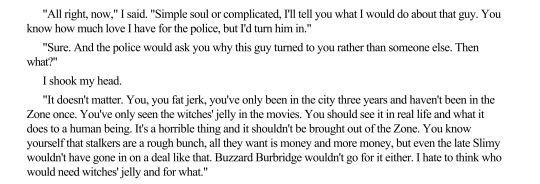
All of these objects aren’t just “cool artefacts”, they’re tools for the Strugatskys to get across their themes.
And those themes are... Well, that’s harder to summarise. The main theme of the story seems to be about how economic circumstances and crises in one’s personal life can rot a person’s moral compass and kill their faith in the possibility of a better world. The events of the story turn someone like Redrick - an honest worker who believes in Kirill’s promises that science has the potential to save humanity - into an evil hypocrite, a murderer who lies to himself to justify his reprehensible actions. The question asked of the audience is “how responsible is Redrick for his own fate”, while the ending asks “will any of it amount to anything”?
To be clear, Redrick is a BAD person. By the end of the book, he has quit his job at the Institute, sold Witches’ Jelly to shady 3rd parties (which ended in a laboratory accident that killed 35), cheated on his wife (with a woman he supposedly despises) and murdered an innocent kid. He even draws sadistic pleasure from the emotional pain he will inflict on Burbridge by killing his son, savouring the irony of Burbridge being the one who kept encouraging him to take some newbie to the Meat Grinder:

But he wasn’t always like this. At the start of the story, he is cynical and rough, but he has principles. Like already mentioned earlier, in the excerpt where Noonan tells him about someone looking to buy Witches’ Jelly, he even goes as far as saying that he’ll work with the police to turn them in. The same police which, earlier in the chapter, stopped him in the street because they profiled him and assumed he was up to something:

Redrick has done his time in prison, gotten an honest job (yes, I know that he says that he still makes "a few bucks on the side”, but he’s actually relieved when he hears they’ll be walling off the Zone because it’ll mean “less temptation”. He wants to make money as a decent citizen), and he’s still being treated like a criminal and stopped by the police on-sight. And despite this, his fear of what the wrong person might do with Witches’ Jelly is so strong, he’s willing to go to them and report the buyer.
And this rejection of his prior Stalker persona is deeper than just getting a job at the institute and being willing to cooperate with police. When Kirill assumes that Redrick suggested getting the Full Empty as a ploy to sell his services, at first, Redrick doesn’t understand what he means. When he does, he feels outright insulted:

When he finds out about Kirill’s death, he is devastated, but notably, this sorrow quickly turns into a hatred of the systems which throw young men to their deaths for money. He curses Ernest for profiting from this exploitation. A key scene is when he hands Creon (a young man who just arrived in Harmont and wants to become a Stalker) a wad of cash and urges him to go back to Malta:

Another pillar of Redrick’s character is the fact that he loves and is loyal to his fiancée, Guta, despite her family being openly antagonistic towards him - not just because of his criminal past, but the fact that he’s been afflicted by the Zone:

He marries her at some point after this.
Most importantly, he actually has a purpose. This is shown when he is pestered by the emigration agent, as he makes a speech about how Harmont is a “hole into the future”, which will change life around the world for the better:
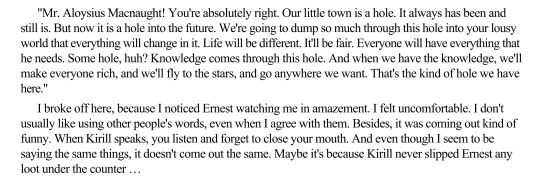
The crucial detail here is that the one who inspired him to think this way is Kirill. Redrick is always portrayed as cynical and bitter, so this high-mindedness is not coming from somewhere within him - it’s external. He’s drawing inspiration from the idealistic, honest people around him. So when Kirill dies, it is not merely the death of a close friend. It is the death of Redrick’s faith, his hope in the future. He even says “How will I get on without you?”:

Basically, Chapter 1 sets-up Redrick AT HIS BEST, so that the story can send him on a downward spiral in every chapter that follows.
Chapter 2 has several important developments, and it marks the start of Redrick’s moral decline. Before getting into that, though, I’d like to draw attention to another part of Redrick’s moral compass which is highlighted - his hatred of Burbridge and, more importantly, his hatred of Burbridge’s daughter, Dina.
Buzzard Burbridge embodies the most reprehensible, slimy aspects of being a Stalker. He is a selfish profiteer, willing to sacrifice his comrades and leave them to die just so he can get away with the loot. Redrick hates Burbridge, and, very importantly, believes himself to be better than Burbridge:

Redrick hates that Burbridge has no regard for human life, and this hatred applies in equal measure to Dina. When Dina tells Redrick that he should have left Buzzard to his death, he slaps her in the face:

This is not done out of sympathy for the man - Redrick hates Burbridge. What insults him is the implication that he should’ve left a comrade to their death - even a piece of sh*t comrade. He hates Dina, because even though what she says about Buzzard is true, it’s not a reason to abandon him to his death. Just like her father, she has no regard for human life.
In this scene, it’s also worth noting that Redrick is very respectful to Hamster. Hamster is the only Stalker to survive entering the Meat Grinder, supposedly saved by Buzzard. He seems to hang around the Burbridge household, possibly acting as some kind of servant, but is deformed and crippled from his injury:

The contrast between how he speaks to Dina and Hamster sends a clear message; Dina’s beauty means nothing. She’s evil, and deserves less respect than ugly, deformed Hamster.
Another key moment is Redrick’s conversation with Noonan in the café near the Métropole hotel. There, we learn why he quit working for the institute; money. He could no longer earn bonuses when expeditions to the Zone began being handled by robots:

Important here is that his salary still isn’t terrible, and the institute did not fire him. He chose to quit, because he wants a sense of freedom, of not being bossed around, and the money to splurge on things (like cigarettes) and have peace of mind. This is aptly summarised in the line “a man needs money so
that he doesn't have to always be counting it”.
Obviously, another reason why he quit is Kirill’s death. In his final, rambling monologue, Redrick admits that he hated working for the Institute, so it’s very likely that Kirill and his idealistic visions for the future were the only things keeping him there.
So, to summarise, at this stage, Redrick’s character looks more or less like this:
1) Wants to do honest work and disassociate from his criminal past.
2) Believes the world can be saved by technology from the Zone.
3) Will never sell Witches’ Jelly to dangerous 3rd parties.
4) Needs money for a basic standard of comfort and freedom from authority.
5) Won’t abandon someone to their death, even someone as bad as Buzzard.
6) Beauty doesn’t matter if, morally, you’re an awful person.
7) Loyal to his wife and daughter.
Having lost Kirill, and with him, his hope for a better future, Redrick’s new source of meaning is his wife and daughter. His purpose in life is providing for them, especially Monkey, whose condition makes her the target of bullying.
(Side note: One thing always annoyed me. Why did they call her Monkey?! That’s asking for people to bully your kid! Was it just a coincidence, or did they really name her after her birth defect? And this is an accurate translation of the Russian “Мартышка”, no weird translation problems here.)
But this new purpose - providing for his family - crashes into him hard when he’s set-up, betrayed, caught by the police, and is forced to flee. It’s then revealed that Redrick had a trump-card up his sleeve - a jar of Witches’ Jelly and an interested buyer, willing to pay the money to his wife in instalments while he rots in prison. It’s never stated how long his prison sentence is, but Redrick estimates that evading arrest (which he did to arrange the transaction) will add another year to it.
To be clear, this jar was prepared as a last resort. He clearly doesn’t want to do this. Earlier, in the Métropole, when he's asked if he managed to procure it, he lies, saying that he didn’t:

He promises to get it later, keeping Throaty interested, but not giving it to him. Later, as he’s about to make the call, he admonishes himself:

This the first major step in Redrick’s decline, where his self-interest explicitly endangers the lives of others, and he still picks himself over others.
Before moving into Chapter 3, one part which I’d like to quickly touch on is the circumstances of Redrick’s arrest. I didn’t pick up on this on my first read, but Ernest wasn’t the one who set-up the police ambush in the Borscht. The one who set up Redrick’s arrest was Richard Noonan:

At first, I was confused as to why Redrick never realised that Noonan betrayed him, but after looking at it more closely, and despite how stupid it may sound, I genuinely think Redrick was so sleep-deprived that he forgot Noonan was the one who told him to drive to the Borscht in the first place. After getting into the cab, he falls asleep and wakes up, incorrectly thinking he told the driver to take him to the bank:

Regardless, in Chapter 3, we learn that Richard Noonan is some sort of government agent, working for the Institute or with law enforcement in some capacity. His mission is to shut down the “flow of materials from the Zone through Harmont”, which is why he has been befriending Stalkers and infiltrating their social circles, monitoring them. His activities include buying artefacts from Stalkers and rerouting them to the Institute:

If you’ve been paying attention, the Stalker which Noonan mentions in the above excerpt, the one he is stringing along and exploiting for his swag, is Creon, the Maltese Stalker which Redrick tried to pay to give up on the profession and go back home in Chapter 1. He persevered, became a successful, and what did it get him? He’s not an adventurer - he’s a pawn, drowning his sorrows in booze, getting closer to death, unaware that he’s being exploited by Noonan.
The worst part of this, which is never said explicitly, but heavily implied, is that the Institute is allowing certain Stalkers to operate because real humans are better, more effective gatherers of artefacts then their officially sanctioned robots. They are supposedly cracking down on this illegal activity, but they don’t mind taking advantage of it while they can:

There’s a sickening duality to it. Officially, Stalkers are criminalised, thrown in jail, ostracised. But behind the scenes, the Institute relies on them to deliver them materials, strings them along and keeps them on their payroll.
(Side note: I’ll let you draw whatever real-life parallels you find applicable. The ones that immediately come to my mind are the US prison-industrial complex and the funding of the the Taliban, but I’m sure you can find many, many more.)
Later, we generally get to see Richard Noonan being a horrid person - beating up a subordinate for having overlooked a group of Stalkers who were sneaking into the Zone without the Institute’s awareness.
Following this, Noonan has his conversation with Valentine Pillman, where the analogy of a “roadside picnic” is used and where the book derives its title. The general message is that we’re completely insignificant. The visitation wasn’t an instance of aliens coming to contact us or conquer us - they were just passing by and accidentally dropped a bunch of their trash on us.
Of course, Pillman qualifies this by saying that this is just his personal theory, and that there is no evidence to support this, or any other interpretation. He points out that to speculate about the motives of non-human beings by applying human psychology to them is folly, and calls xenology a pseudoscience.
For how central this conversation seems to be to the book (it’s in the title, after all), I don’t actually think that it’s a particularly interesting concept. It speaks to a general existential dread many people can probably relate to, being insignificant in the face of the infinitely complex, incomprehensible mechanisms of the cosmos. But it seems quite simple and self-contained, especially compared to the layered, interconnected themes of the rest of the book. It’s quaint.
Much more interesting to me are the things we find out about the artefacts recovered from the Zone. Eternal Batteries, seemingly capable of producing infinite energy, are used to power people’s private cars. Black Sprays, little beads which one theory claims are huge swathes of compressed space, are used to decorate jewelry:
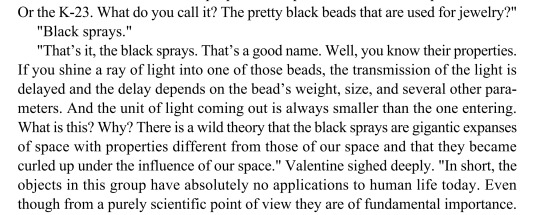
To be blunt, Kirill was wrong. The artefacts from the Zone and the research done by the Institute are not “saving the world”. They’re accomplishing almost nothing. At best, they become the playthings of the wealthy and powerful, while the working class is literally killing themselves in the Zone to acquire them. At worst, they’re causing horrible accidents and killing people, like the Currigan labs incident:
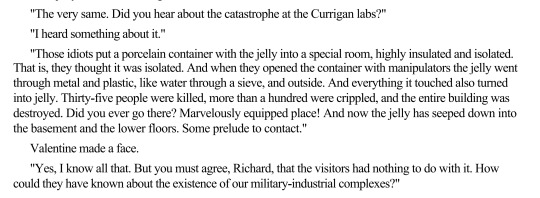
The point of this is to show that fancy new technology does not inherently uproot old systems of injustice and exploitation. Without societal change, even something as reality-shattering as an alien invasion will be slotted into the old way of things. There’s even a passing mention of more luxury accommodations being built in Harmont in response to... tourists:

I saw another Tumblr post tagged with #roadside picnic, complaining about how people are trying too hard to make every soviet novel into something political. Well, I’m sorry. IT IS POLITICAL. You’re just not paying attention. If you disagree, I challenge you to read the above passage about “the suburbs being emptied” and tell me that it’s not trying to communicate anything about the economical systems ruling Harmont.
And if I need to spell it out, the force consuming and destroying the lives of Stalkers is not “the Zone”. It’s capitalism. The characters constantly talk about greenbacks, about needing money. The reason Stalkers need to break the law and risk their lives is either because they have rent to pay, or because they want to become financially stable enough to be free from the coercion of bosses and landlords.
The entire reason Redrick betrays his moral convictions in Chapter 2 is because of money. He leaves the Institute because his job is being automated, his pay is being cut, and he doesn’t want to live paycheck to paycheck. He wants to be free. And finally, he sells the Witches’ Jelly because he has to keep his family fed while he’s stuck in jail.
And if you still think I’m just reading too much into things, seeing what I want to see, I’d like to take you back to Chapter 2 for a few notable passages. Namely, Redrick’s experiences as he is entering the luxury hotel, Métropole:

This is Redrick, talking to a cop. Yes, the police, so eager to harass him in Chapter 1, are suddenly asking him if he’s alright, offering to help, calling him “mister”. So what changed?
Well, he is wearing a suit, holding a suitcase, standing in front of a fancy hotel. They assumed he’s rich. That he’s a respectable citizen, that he’d never need to steal anything.
There’s a genius reversal here - in Chapter 1, Redrick was an honest lab worker, but was profiled and stopped by the police. In Chapter 2, while the cop is trying to help him, he’s on his way to an illegal deal with a suitcase full of contraband. He’s an actual criminal, but he’s treated with kindness, because he looks upper-class.
And if you still somehow think this is all a coincidence, I ask you - why is this scene here? Why was it written? Seriously, it’s such a random moment, a complete non-sequiteur from everything happening beforehand, and I never hear anyone talk about it. Redrick, out of nowhere, begins having strong hallucinations and has to stop to catch his breath. If the key information being conveyed here is “Redrick suffers from hallucinations”, why not just have him catch his breath and move on? Why add this random cop, trying so hard to be helpful?
The answer is simple. It’s not a “random cop”. It’s social commentary on how cops exist to protect and serve the ruling class.
In the hotel itself, we have this moment where Redrick steps into an elevator full of absurdly, comically obnoxious rich people:

If you’ve been ignoring the attached excerpts so far, I urge you to read this one. I cannot adequately summarise how seeping with contempt and revulsion these descriptions are. Redrick closes his eyes to try to “shut out” these people, to not have to look at them. The young boy is eating chocolate, of course, drooling, while his mother has the Black Sprays we talked about earlier on her necklace. This is the privileged, wealthy elite and Redrick HATES them and what they represent. It’s textbook class antagonism.
And this doesn’t just affect Redrick. Returning to Chapter 3, Noonan visits Redrick’s house and speaks to Guta, who tells him about their struggles with Monkey, whose condition had worsened, destroying most of her cognitive abilities:
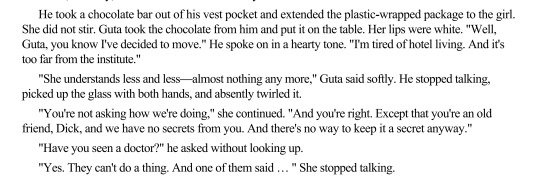
Noonan is wealthy. He’s one of the people who uses a car powered by an Eternal Battery. He lives in hotels. But more importantly:

Noonan genuinely sympathises with Redrick and Guta’s plight, and the suffering they’re going through because of Monkey’s condition. He genuinely wants to help them, and is ready to, but then remembers his boss. He remembers that his job is not to help the ones who are struggling and need it the most, but to serve the system. To label these people criminals and “infiltrate” them, monitor them, instead of simply befriending them.
Of course, Richard Noonan is an awful person. But we're almost given the sense that, given his position, he doesn’t even have an opportunity to be a good, honest person. When he genuinely feels sympathy for those he exploits, he forces himself to stop and suppresses his good nature. Because that’s what’s expected of him, what his job requires. He’s there to protect the interests of the Institute - the ruling class.
I really hope these examples adequately demonstrate what I believe to be the main political themes of the story, because I’m going to put those aside for a moment and go back to the personal, moral journey of the main character.
The only thing of note left in Chapter 3 is Redrick’s father and his reaction to news of the lab accident.
[UNIFNISHED DRAFT ENDS HERE]
(TRANSLATION NOTE: All quotations are taken from the Antonina W. Bouis translation, despite there being an arguably more accurate translation by Olena Bormashenko. This is out of habit, not preference - I’m more familiar with the Bouis translation, which made searching for quotes easier.)
(Huge thanks to Antonina W. Bouis and later Olena Bormashenko for bringing this book to an anglophone audience, to Irena Lewandowska and Rafał Dębski for translating it to Polish, and to Siergiej Rajkov and Milan Asadurov for doing the same in Bulgarian.)
#roadside picnic#stalker#otherside picnic#parties are for losers#book analysis#strugatsky brothers#My writing
120 notes
·
View notes